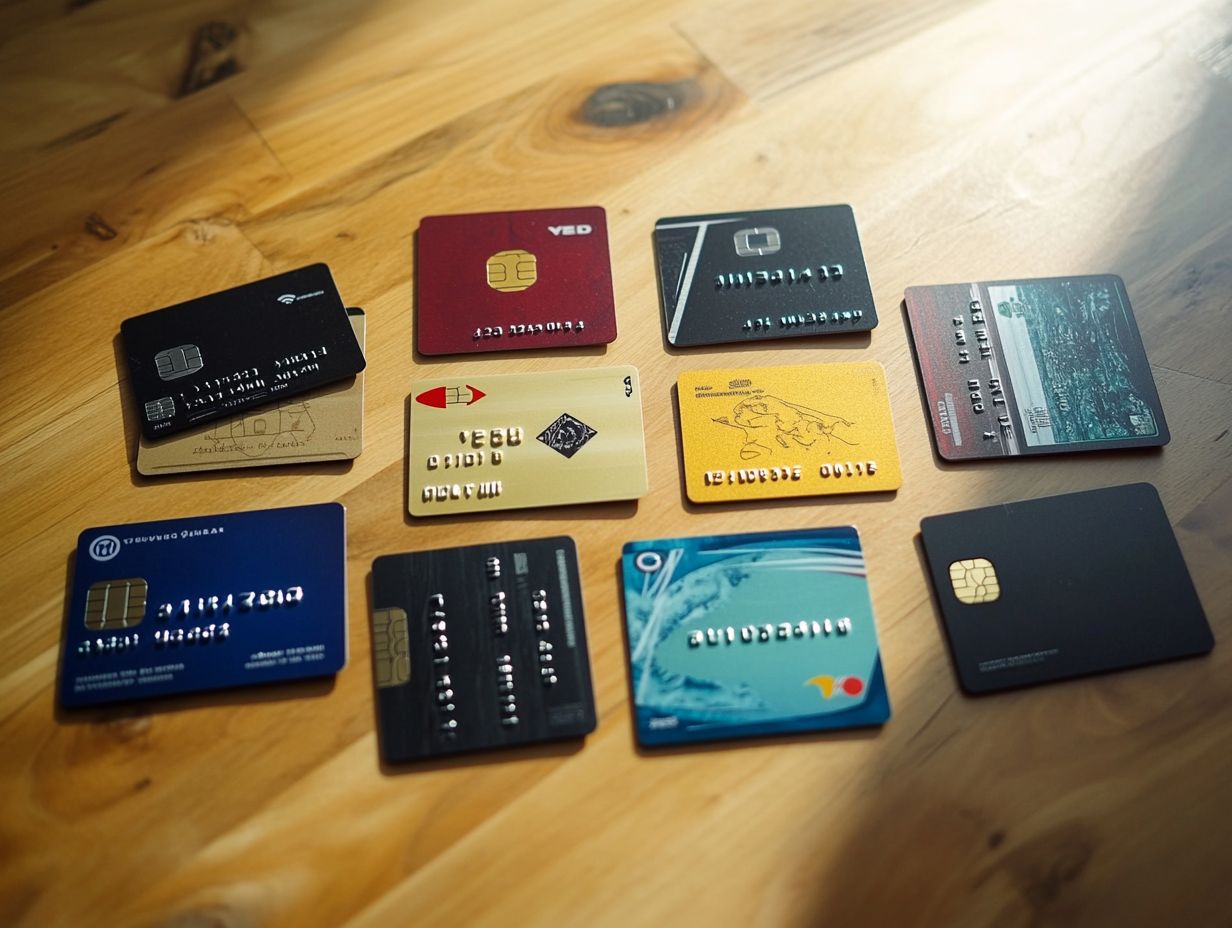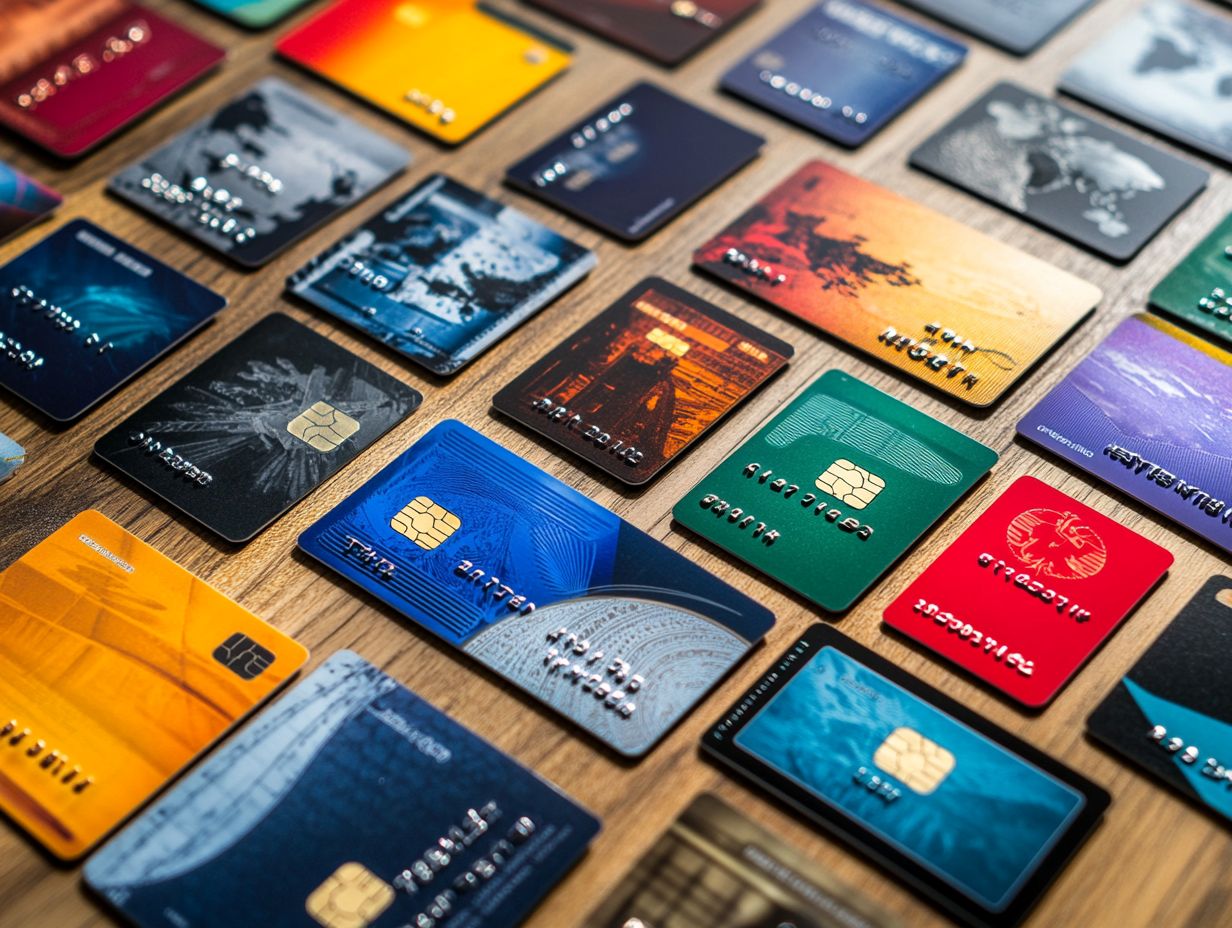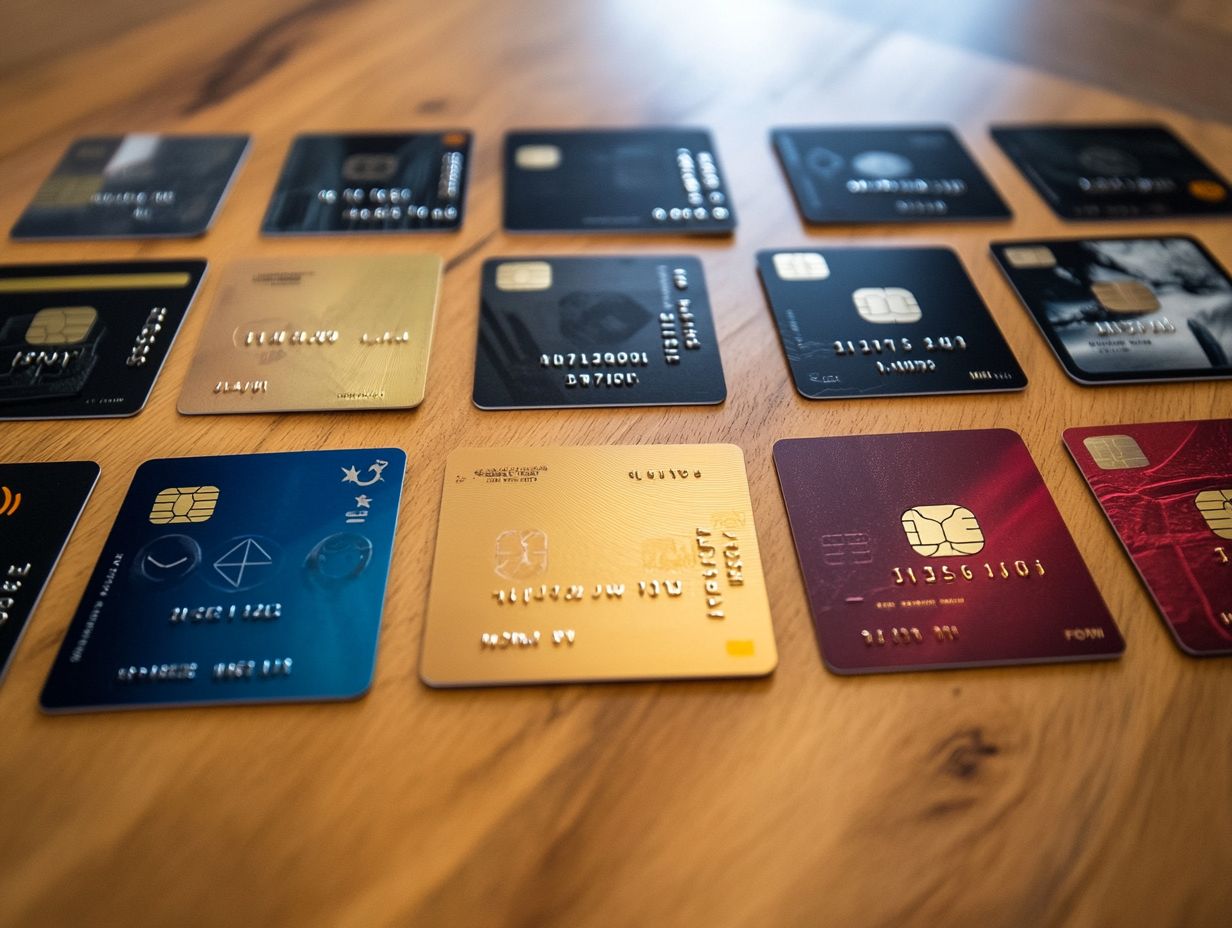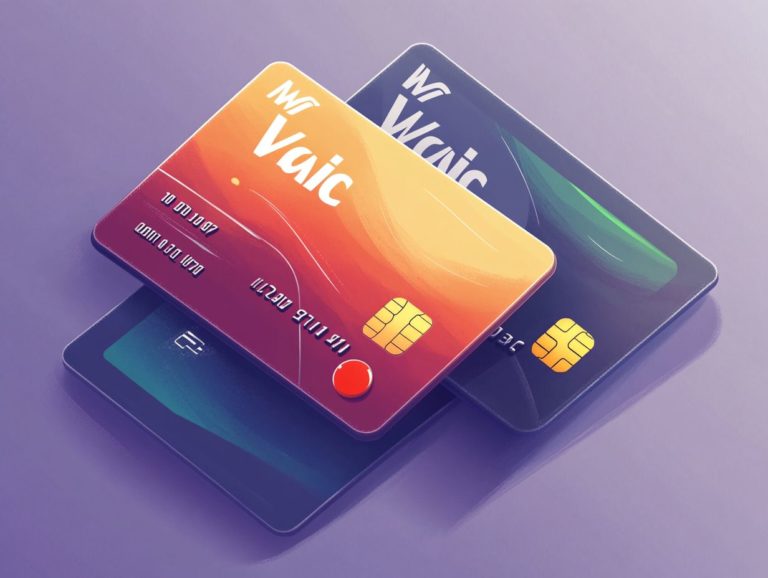Exploring the Different Types of Credit Cards
Credit cards can unlock exciting rewards! They serve as powerful financial tools when used wisely.
This article covers the basics of credit cards, starting with a clear definition. We will explore various types, including secured, unsecured, rewards, and cashback cards.
You’ll learn how to choose the right card for your lifestyle. Plus, you ll find tips for managing your card responsibly.
Whether you re new to credit cards or looking to optimize your current one, this guide has valuable insights for everyone.
Contents
Key Takeaways:

- Credit cards come in many types, each with unique features and benefits.
- Secured and unsecured cards differ in application requirements and risks.
- Consider your spending habits and financial goals when selecting a card.
Understanding Credit Cards
Understanding credit cards is key to managing your finances. They can serve a range of purposes, from everyday purchases to significant milestones.
With options like rewards, cashback, and secured cards, it’s essential to know how these can fit your goals.
Stay informed about important aspects like credit scores, annual rates, and potential fees. The Consumer Financial Protection Bureau offers good insights to help you use credit cards wisely.
What are Credit Cards?
Credit cards are financial tools from banks or financial institutions. They let you borrow money for purchases up to a set limit based on your credit score.
These cards use a system that allows you to spend, repay, and borrow again without reapplying. Your credit limit affects how much you can charge and your overall financial flexibility.
Using credit responsibly, like making timely payments, can improve your credit score. This is important for securing loans and getting favorable interest rates later on. The Consumer Financial Protection Bureau also provides guidance to keep you informed about your rights and credit management.
Types of Credit Cards
You ll find a remarkable array of credit cards designed to meet a multitude of needs. Rewards credit cards provide enticing incentives, while secured cards are for those aiming to build their credit history.
Understanding the differences among these types is crucial for making informed choices. Whether you’re after cash back, travel rewards, or business expenses, learning how to choose the right credit card for you ensures there’s something for everyone.
This diverse selection also features:
- Balance transfer credit cards to help you manage existing debt,
- Low-interest credit cards for those prioritizing affordability,
- Student credit cards tailored for new borrowers stepping into the world of credit.
Secured vs. Unsecured
Secured credit cards require a cash deposit that serves as collateral, which sets your credit limit. These cards are perfect for anyone looking to boost their credit scores! In contrast, unsecured credit cards don t need a deposit and are evaluated based solely on your credit history and scores.
This distinction is crucial as you explore your financial options. Secured cards generally have lower annual fees and frequently report to credit bureaus, helping you build a positive credit history over time.
On the other hand, unsecured credit cards often provide more attractive rewards programs, better interest rates, and additional benefits like travel insurance. This makes them appealing to those with a solid credit history. However, they may come with higher fees and interest rates for individuals just starting their credit journeys.
By understanding the trade-offs between these types of credit cards, you can make informed choices that fit your financial situation.
Rewards vs. Cashback

Rewards credit cards let you earn points or miles for every purchase, which you can redeem for travel, goods, or services. In contrast, cash back credit cards return a percentage of your spending as cash, making them ideal for those who appreciate straightforward benefits.
These two credit card types have unique structures designed to fit your spending habits and financial goals. For example, a popular travel rewards card like the Chase Sapphire Preferred allows you to accumulate points that can be transferred to various airline and hotel loyalty programs, opening up a world of travel perks.
If you prefer simplicity, consider a cash back card like the Citi Double Cash Card, which gives you 2% cash back on all purchases. It s a great choice for avoiding the complexities of points systems.
While rewards cards may involve a more complex points redemption process, they can provide significant benefits for travel enthusiasts. Just remember, cash back cards offer immediate returns, which are fantastic for everyday expenses, even if they lack the thrill of long-haul travel rewards.
Travel vs. Store-Specific
Travel rewards credit cards are designed for frequent travelers, allowing you to earn points or miles that can be redeemed for airline tickets, hotel stays, or other travel-related costs. Conversely, store-specific credit cards cater to shoppers, providing discounts and rewards at particular retailers.
These two card types address different consumer behaviors and are tailored to meet your unique needs based on your lifestyle. If you re a frequent flyer, you can maximize the benefits of travel rewards cards by accumulating points from various expenses think dining out or grocery shopping. This often translates into substantial savings for your next adventure.
If you tend to shop at specific retailers, store-specific cards can unlock exclusive offers and cashback opportunities, making them a smart choice for everyday purchases.
To choose the right card for you, evaluate your shopping habits and travel frequency. Consider where you spend the most and how often you travel. Balancing the benefits with any fees or redemption restrictions is essential for making a well-informed decision.
Choosing the Right Credit Card for You
Selecting the ideal credit card requires careful consideration of your financial goals. Understand your credit score and leverage resources like pre-approval tools or credit card comparison platforms. These tools will help you pinpoint options that align perfectly with your needs.
Start exploring your options today to find the card that best suits your lifestyle!
Factors to Consider
When selecting a credit card, it’s crucial to consider several important factors, including the associated fees, the annual percentage rates (APR), your credit score, and how well the card aligns with your financial goals.
The types of fees can greatly impact your overall costs. For instance, a card with a high annual fee may not be worthwhile if the rewards fail to match your spending habits. Understanding the APR is crucial. A higher rate means more interest charges if you don t pay your balance on time. Imagine carrying a $1,000 balance on a card with a 20% APR this could result in over $200 in interest within a year.
Evaluating your credit score is essential since it directly influences the rates and terms available to you. By aligning the card s benefits, such as cash back or travel rewards, with your specific spending patterns, you can significantly enhance your overall financial strategy.
How to Compare Different Cards
Utilizing a credit card comparison tool can greatly simplify your journey in evaluating different credit card options based on interest rates, rewards, fees, and additional features. This ensures that you select a card that aligns perfectly with your financial aspirations.
By entering your preferences and spending habits, you can quickly identify the cards that provide the most appealing annual percentage rates (APR) and customized rewards structures. This tool not only saves you valuable time but also offers clear insights into the nuanced differences between various options.
For instance, one card may boast a higher cash-back rate on groceries, while another shines in travel rewards. By systematically comparing these factors, you give yourself the power to make informed decisions that maximize benefits while keeping costs associated with credit use to a minimum.
Managing Your Credit Card

Effectively managing your credit card is essential for preserving a strong credit score and ensuring your overall financial well-being. This involves understanding your spending habits, making timely payments, and steering clear of unnecessary credit card debt.
Tips for Responsible Credit Card Use
Take charge of your finances and watch your credit score soar! To use credit cards responsibly, establish a budget, make payments on time, and keep your credit utilization low that is, the amount you owe compared to your credit limit.
- Systematically track your income and expenses to gain a clearer understanding of your spending habits.
- Pay off the full balance each month to avoid pesky interest charges and promote savings over time.
- Regularly monitor your credit score for insights into your financial health and to spot any discrepancies or areas for improvement.
These practical strategies not only encourage responsible credit card use but also lay the groundwork for a strong financial foundation, giving you the power to pursue significant life milestones with confidence.
Dealing with Credit Card Debt
Dealing with credit card debt requires a proactive stance. Employ strategies like consolidating your debt through balance transfer credit cards, altering your spending habits, and setting realistic financial goals to reclaim control over your finances.
Using balance transfer cards, which allow you to transfer your debt from one card to another at a lower interest rate, can dramatically cut down on interest rates. Crafting a comprehensive budget helps you track expenses and pinpoint areas for improvement.
If you ever feel overwhelmed, seeking counseling services can offer tailored advice and support for managing your debt. Establishing specific savings goals can inspire you to curb unnecessary spending, leading to a more stable financial future.
Frequently Asked Questions
What are the different types of credit cards?
There are several types of credit cards. These include rewards cards, balance transfer cards, secured cards, and cashback cards.
Each type has unique benefits, so choose one that fits your needs and spending habits.
What are the benefits of a rewards credit card?

A rewards credit card helps you earn points, miles, or cashback for every dollar you spend. You can redeem these rewards for travel, gift cards, or even statement credits.
Some rewards cards come with perks like airport lounge access or travel insurance. Unlock amazing rewards!
Can you explain what a balance transfer credit card is?
A balance transfer credit card lets you move existing credit card debt to a new card with a lower interest rate. This can save you money on interest and help you pay off your debt faster.
Be mindful of any balance transfer fees and aim to pay off the balance before the promotional period ends.
How does a secured credit card work?
A secured credit card requires a security deposit, usually equal to your credit limit. This deposit acts as collateral and helps build your credit history.
Using a secured card responsibly can improve your credit score over time. Take control of your financial future!
What is the difference between a traditional credit card and a charge card?
Both card types let you make purchases on credit. A traditional credit card allows you to carry a balance, while a charge card requires you to pay in full each month.
Charge cards often have higher credit limits and no preset spending limit.
Can you have more than one credit card?
Yes, you can have multiple credit cards. Just use them responsibly to avoid accumulating too much debt.
Different types of credit cards can help you maximize rewards and enjoy various benefits, especially if you know how to find the right credit card for your needs and manage them well.






